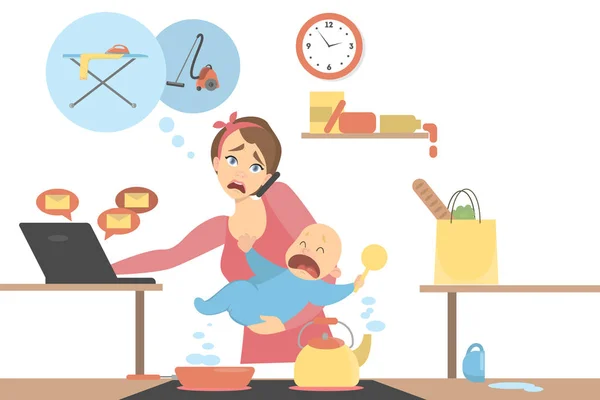
What if I got a little help in my daily life? This question, many individuals in search of well-being ask themselves every day. However, many are still hesitant for fear of not finding their way financially . Perhaps also for fear of entrusting their accommodation to strangers. Legitimate fears but quickly forgotten when we have tasted the comfort of life brought by the intervention of a personal service provider at home to support us in the performance of daily tasks. We take stock of the many advantages of receiving help at home.

A simple yet useful question is what exactly is covered by the term “home care services” and what activities are involved? What are the possible intervention methods? What training is required?
In fact, the activities of personal services are very large and governed by the law. They bring together 26 different activities, in accordance with article L 7231 – 1 of the French Labor Code. : childcare; tutoring ; assistance to the elderly or disabled; housekeeping and housework services; small gardening jobs; small DIY services; computer, internet and administrative support services; care and walks of pets, with the exception of veterinary care and grooming, for dependent persons, …
Please note, in certain cases, service providers in the personal services sector must have specific approval or authorization from an organization. This is a sine qua non for being able to practice in accordance with the law. This concerns so-called “fragile” audiences and young children. These are home care or support services for children under three years old, home help for people aged at least 60, assistance for disabled or dependent people, caring for the sick, providing personal vehicle driving for dependent people, mobility assistance and support outside the home of elderly or disabled people, etc.
Only these 26 services allow you to benefit from a reduced VAT rate of 10%.
Becoming an individual-employer can sometimes quickly turn into a puzzle between tax and social declarations, tax credit declarations, the entry of Cesu, the calculation of contributions, charges, unforeseen expenses, exemptions, holidays of your employees at home …
Unload yourself to the end by calling on Augias who will assist you in these various administrative procedures. What to be really calm, especially if you want to remain in control of your choice of personal service providers who intervene in your home.
Our networking platform is your guarantee of choosing with complete peace of mind qualified service providers trained by us. We have, in fact, set up training methods with professionals that ensure you benefit from the same quality of service regardless of the professional you choose. However, you are not considered as a private employer if you choose to use a personal assistance service structure.
The Cesu comes in the form of a simplified offer to easily declare the remuneration of your employee at home for personal service activities. “The Cesu concerns all individuals at different times in their lives, to improve daily life, to take charge of a few hours of cleaning or to support an elderly or disabled person. It is also the guarantee for the employee to have rights to health insurance, unemployment, retirement, etc. », Explains URSSAF. The Cesu can be used on a regular or occasional basis, for part-time or full-time employment. It is a reporting device. It does not allow the employee to be paid.
Personal home services are among the activities benefiting from an advantageous tax framework with reduced VAT and the tax credit . This sector with high added value in terms of jobs, presents, for individuals, advantages which deserve to be studied in depth .
What is the procedure ? You can benefit from a tax credit if you incur expenses for personal services provided to you at your main or secondary residence located in France, whether you own it or not. The tax credit is equal to 50% of the expenses actually incurred, with an annual limit of 12,000 euros, possibly increased by 1,500 € and the increased limit cannot exceed 15,000 €.
To benefit from the tax credit, you must indicate the amount of the expenses in your income tax return . Subsequently, the amount of the tax credit is automatically calculated by the tax authorities and appears on your tax notice. Until then, a deposit of 60% was paid to you in January, depending on the amount of the tax credit received the previous year. The balance was paid to you in the summer by the tax authorities based on your actual expenses. And if you received too much down payment in January, you owed the overpayment in September.
The instant tax credit will come into force at the very beginning of 2022 for individuals directly employing their employee, and probably three months later for those who pay their housekeeper or their gardener through a service company. anybody. With the new system, the tax benefit is immediate , on the principle of third-party payment. Individual employers will thus only have to pay 50 % of the actual cost of the service, while the employee will receive the other half of his payment directly from the State.
A concrete example : a couple who employs a household help at home or calls for occasional homework help up to 200 euros per month must wait for the income tax return to declare the 2,400 euros paid during the year and thus obtain a tax credit worth 1,200 euros. From January 2022, the mechanism will be both easier administratively and less alienating from a financial point of view. From then on, private employers will pay only half of the bill of the person working at their home and it will be the State which will pay the second half directly to the employee or to the intermediary company. There is therefore no need to advance the sums due to the State.
As such, and contrary to popular belief, not declaring your human service employees in reality presents no advantage, neither for the employer nor for the employee, who both run great risks .
Find out all you need to know in our article “The Underground Market, The First Competitor To Human Services Companies – The Risks of Undeclared Work in EWS”.
Do not wait any longer to take care of yourself or to take care of your daily tasks and enjoy your free time! Augias accompanies you .
